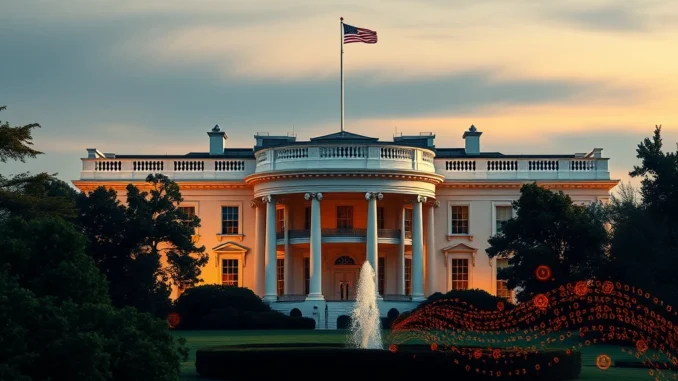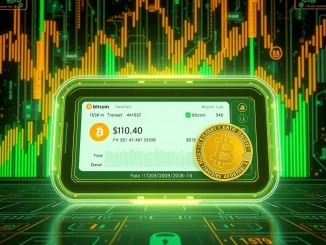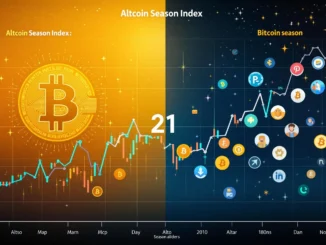
Get ready for a potentially seismic shift in the cryptocurrency landscape! Whispers from Washington suggest the U.S. White House is seriously considering bolstering its digital asset holdings with none other than Bitcoin. This news, surfacing from a private roundtable, has sent ripples of excitement and speculation throughout the crypto community. Is this the dawn of a new era for Bitcoin and its integration into mainstream finance? Let’s dive deep into what this could mean for you and the future of digital currency.
Why a Strategic Bitcoin Reserve? Understanding the White House’s Potential Rationale
The revelation comes from Bo Hines, a key figure as the executive director of the White House’s digital assets working group. According to a report by Decrypt, Hines indicated that the Trump administration is exploring the acquisition of a significant amount of Bitcoin reserve. When questioned about the scale of this potential accumulation, his analogy was striking: “How many dollars would you want?” This hints at a potentially substantial, long-term vision for Bitcoin within the U.S. financial framework.
But what exactly is driving this interest in a strategic Bitcoin reserve? Several factors could be at play:
- Diversification and Modernization of Assets: Nations traditionally hold reserves in assets like gold and foreign currencies. In an increasingly digital world, Bitcoin presents itself as a modern, decentralized alternative. Adding Bitcoin to the national reserve could be seen as a forward-thinking step to diversify holdings and adapt to the evolving financial landscape.
- Geopolitical Strategy: In a world where digital assets are gaining prominence, nations holding significant Bitcoin reserves could gain a strategic advantage. It positions the U.S. at the forefront of the digital economy and potentially enhances its influence in the global financial system.
- Future-Proofing Against Inflation: Bitcoin’s limited supply (capped at 21 million coins) is often touted as a hedge against inflation. As fiat currencies face inflationary pressures, holding a deflationary asset like Bitcoin could be seen as a prudent measure to protect national wealth over the long term.
- Embracing Technological Innovation: A move towards a Bitcoin reserve signals a broader acceptance and embrace of blockchain technology and cryptocurrencies by the U.S. government. This can foster innovation within the domestic crypto industry and attract talent and investment.
Budget Neutral Bitcoin Buys: How Would the US Acquire Bitcoin?
While the prospect of the White House amassing Bitcoin is thrilling, practical questions arise. A White House official clarified that any Bitcoin purchases would be “budget-neutral.” This crucial detail suggests that the acquisition wouldn’t involve direct government spending that increases the national deficit. So, how might this be achieved?
- Asset Swaps: The government could potentially swap existing assets for Bitcoin. This could involve selling off less strategic assets to acquire Bitcoin without impacting the budget.
- Seized Assets: A portion of Bitcoin acquired through law enforcement actions, such as seizures from illicit activities, could be allocated to the strategic reserve.
- Gradual Accumulation: The acquisition could be a gradual process, utilizing various methods over time to build up the reserve in a budget-conscious manner.
The exact mechanisms are yet to be detailed, but the commitment to budget neutrality indicates a measured and strategic approach to building this White House Bitcoin reserve.
Strategic Bitcoin Reserve Legislation: A Law in the Making?
Bo Hines further indicated support for legislation that would formally establish a Strategic Bitcoin Reserve. While he didn’t endorse any specific bill, this suggests a willingness within the administration to codify this initiative into law. What might such legislation entail?
- Formal Mandate: Legislation could formally mandate the creation and maintenance of a Strategic Bitcoin Reserve, outlining its purpose and operational guidelines.
- Governance and Oversight: It would likely establish a framework for the governance and oversight of the reserve, specifying which government agencies would be responsible for its management and security.
- Acquisition and Custody Rules: The legislation could detail the rules and procedures for acquiring, storing, and managing the Bitcoin within the reserve, ensuring transparency and accountability.
- Long-Term Strategy: It could outline the long-term strategic goals for the reserve, including its role in national financial security and economic competitiveness.
Impact and Implications: What Does This Mean for the Crypto World?
The mere suggestion of a U.S. strategic Bitcoin reserve has significant implications for the cryptocurrency market and beyond:
- Increased Legitimacy: Government adoption, especially by a major global power like the U.S., lends immense legitimacy to Bitcoin and the broader crypto asset class. It signals a shift from viewing Bitcoin as a fringe asset to recognizing its potential as a mainstream financial tool.
- Market Demand Surge: A large-scale acquisition by the U.S. government would inject significant demand into the Bitcoin market, potentially driving up prices and attracting further institutional investment.
- Global Ripple Effect: If the U.S. establishes a Bitcoin reserve, it could prompt other nations to consider similar moves, leading to a domino effect of government adoption and further mainstream integration of cryptocurrencies.
- Regulatory Clarity: This initiative could spur further regulatory clarity around cryptocurrencies in the U.S. and globally. Governments may need to develop more comprehensive frameworks to manage and oversee digital asset reserves.
Challenges and Considerations: Navigating the Road Ahead
While the prospect is exciting, establishing a US Bitcoin policy and a strategic reserve also presents challenges:
- Security and Custody: Securing a national Bitcoin reserve of significant size is a complex undertaking. Robust security measures and secure custody solutions are paramount to prevent theft or loss.
- Market Volatility: Bitcoin’s price volatility remains a concern. Managing a reserve in a volatile market requires sophisticated risk management strategies.
- Regulatory Hurdles: Navigating existing and evolving regulatory landscapes for cryptocurrencies will be crucial. Clear legal frameworks are needed to support the operation of a national reserve.
- Public Perception and Education: Public understanding and acceptance of cryptocurrencies are still evolving. Education and communication will be vital to ensure public support for this initiative.
Conclusion: A Pivotal Moment for Bitcoin and the Future of Finance
The news that the White House is considering expanding into Bitcoin reserves marks a potentially pivotal moment for the cryptocurrency world. It signifies a growing recognition of Bitcoin’s strategic importance and its potential role in the future of finance. While challenges exist, the potential benefits of a strategic Bitcoin reserve – from enhanced national financial security to global leadership in the digital economy – are compelling. As the U.S. government explores this bold new frontier, the world watches with anticipation, ready to witness the next chapter in Bitcoin’s remarkable journey.



